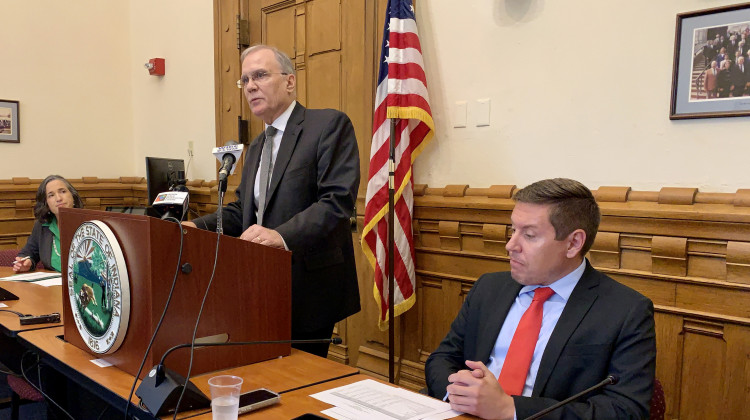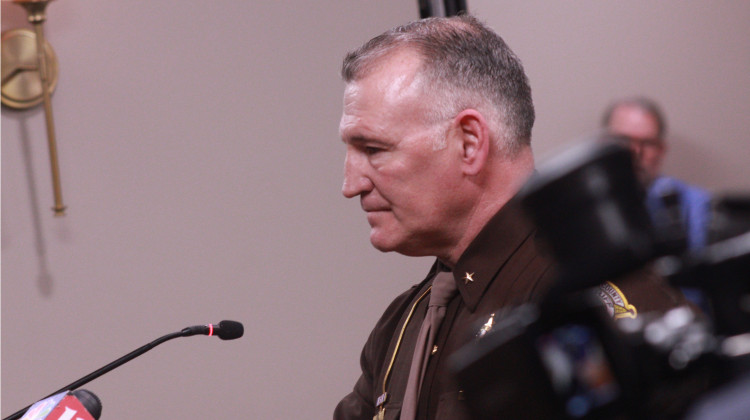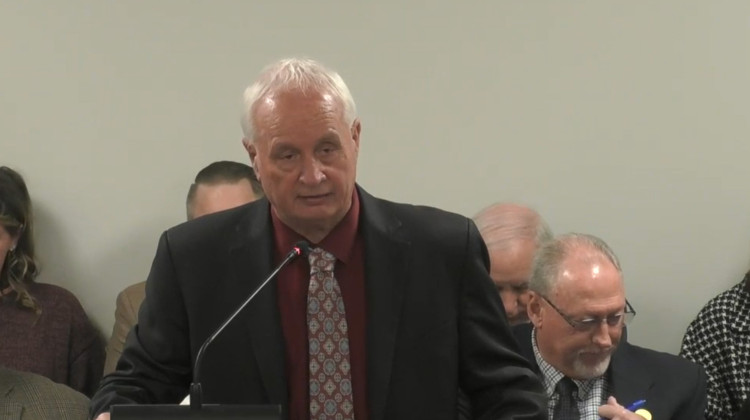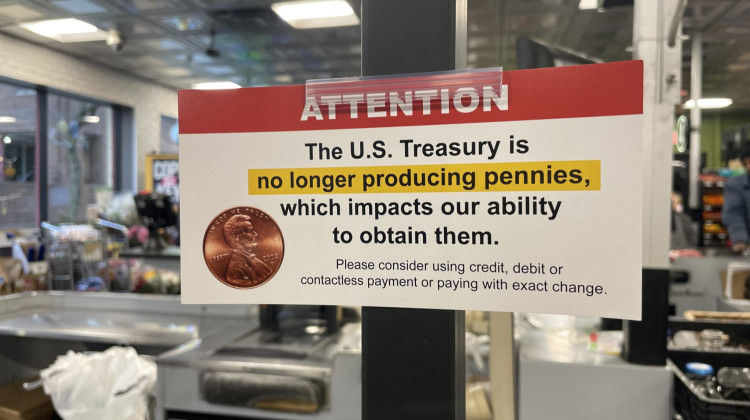
Office of Management and Budget Director Cris Johnston (center) discusses the end of Indiana's 2021 fiscal year, along with State Auditor Tera Klutz (left) and State Budget Director Zac Jackson (right).
Brandon Smith/IPB NewsHoosiers will get a state tax refund when they file their taxes next year.
That’s because the state finished the year with budget reserves of $3.9 billion, triggering Indiana’s automatic taxpayer refund.
The automatic taxpayer refund was created a decade ago and only used once, in 2012, sending a $111 credit to Hoosier taxpayers.
After that, lawmakers made it harder to trigger. Essentially, Hoosiers get the refund if state budget reserve dollars are more than 12.5 percent of the total budget. And the state's tuition reserve – a sort of rainy day pot for school funding – isn't calculated as part of the total reserve.
Even in April, as legislators finalized a new state budget, they didn't think they would trigger the refund. Lawmakers were spending hundreds of millions of dollars this year out of reserves to help pay down state debt, renovate the state's police academy and send money to schools to help student learning loss from the pandemic.
And then, in just the last three months, Indiana brought in $1.2 billion more than lawmakers expected.
Office of Management and Budget Director Cris Johnston said he never imagined the state would be in this strong a position.
“I think we were cautiously optimistic, but to be having a taxpayer refund at this magnitude – we weren’t prepared for that.”
READ MORE: How Is Indiana Distributing COVID-19 Vaccines? Here's What You Need To Know
Join the conversation and sign up for the Indiana Two-Way. Text "Indiana" to 73224. Your comments and questions in response to our weekly text help us find the answers you need on COVID-19 and other statewide issues.
The refund will show up as a tax credit when people file their taxes next year. And the exact amount per person won’t be determined until later this year, likely around November. In a statement, House Speaker Todd Huston (R-Fishers) said early estimates suggest it could be $170 per taxpayer (and $340 for joint filers).
The way the automatic taxpayer refund law is set up, half of the so-called "excess reserves" will go to the taxpayer refund (this year, that's $545.3 million). The other half is used to help pay off a teacher pension fund.
Democrats attribute the strength of state revenues to the COVID-19 relief package approved by congressional Democrats and President Joe Biden earlier this year. And Johnston said all the federal coronavirus relief – created under both Biden and President Donald Trump – made a huge difference in helping state revenues recover.
State budgets across the country are rebounding because of federal help. But State Auditor Tera Klutz said Indiana was already more well-positioned than many of its neighbors because of its existing fiscal strength.
"We can move Indiana now much farther ahead so that we can continue providing the best place to work, live and play for our residents," Klutz said.
State Republican leaders heaped praise on themselves, pointing to pre-existing budget reserves that helped Indiana weather the storm of COVID-19, a rebounding private sector and unemployment rates that have returned to pre-pandemic levels.
Democratic fiscal leaders don't want the spending to stop. Rep. Greg Porter (D-Indianapolis) wants the state to spend some of its remaining budget reserves on minority health initiatives, teacher pay increases and student loan debt relief. Sen. Eddie Melton (D-Gary) proposes using reserve dollars on increased pre-K education funding.
Speaker Huston said he wants to pursue "sustainable tax cuts and reforms" when lawmakers return for a new legislative session next year.
OMB Director Johnston preaches caution. State revenues improved by 14 percent from last year to this year, when accounting for a shift in tax payments because of postponed deadlines during the pandemic. But he said that kind of growth isn't sustainable.
"The same uncertainty we had about how long the adverse situation was going to occur [during the pandemic], I think that's one thing that the fiscal leaders across state government need to be mindful of," Johnston said. "This can't go on forever."
Contact reporter Brandon at bsmith@ipbs.org or follow him on Twitter at @brandonjsmith5.
 DONATE
DONATE






 Support WFYI. We can't do it without you.
Support WFYI. We can't do it without you.